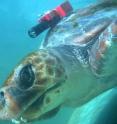Turtles watch for, snack on gelatinous prey while swimming
Related images
(click to enlarge)
Loggerhead turtles use visual cues to find gelatinous prey to snack on as they swim in open waters, according to research published June 12 in the open access journal PLOS ONE by Tomoko Narazaki and colleagues from the University of Tokyo, Japan. Tracking underwater movements with 3D loggers and National Geographic Crittercams, the researchers found the turtles relied on sight, rather than sound or smell, to identify and move toward gelatinous, floating prey like jellyfish and other organisms; one turtle even swam toward a floating plastic bag. Turtles in this study foraged for such foods approximately twice every hour, suggesting they may rely on such gelatinous prey for energy more than previously thought.
Previous studies have shown that turtle diets vary with their age, habitat and other factors, but adult turtles depend on deep-sea hard-shelled animals like mollusks for food. The gelatinous prey studied here are low-energy, easily digestible foods that are unlikely to replace these other prey. However, the authors suggest that opportunistic foraging on such prey may benefit loggerhead turtles during oceanic migrations, when prey at the bottom of the sea is harder to reach.
The study also offers insights into the foraging habits of these turtles, listed an endangered species by by the International Union for Conservation of Nature (IUCN). The authors add that the methods used here could be developed to map areas with higher foraging opportunities along oceanic migratory routes for loggerhead turtles.
Source: Public Library of Science
Other sources
- Turtles watch for, snack on gelatinous prey while swimmingfrom Science DailyThu, 13 Jun 2013, 0:30:32 UTC
- Turtles watch for, snack on gelatinous prey while swimmingfrom PhysorgWed, 12 Jun 2013, 21:05:09 UTC
